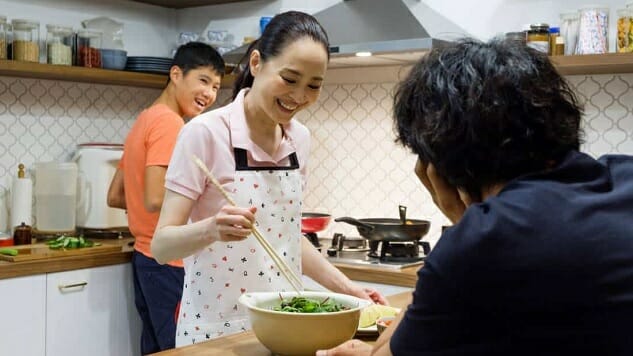Ramen Shop

There’s a scrumptious niche of cinema-orbiting food, food culture and cultural history comprising classics and masterworks: Tampopo, Big Night, Eat Drink Man Woman, Babette’s Feast. Add to that number Ramen Shop, Singaporean filmmaker Eric Khoo’s latest, a piece so gentle and breezy that viewers may be fooled into thinking it weightless.
Like the best “food porn” movies, Ramen Shop is an expression of authentic passion, the kind fostered by abiding connections not simply to food but to the people, places and times food recalls. Even before Khoo swaps locations from Japan to Singapore (where the bulk of the narrative plays out), he diligently photographs beautiful, carefully composed ramen bowls laden generously with pork, eggs, scallions and other accoutrement, all resting on a bed of noodles bathing in broth steaming right through the screen and into viewers’ nostrils. Khoo captures the esteem by which ramen is held in Japanese culture and its accompanying sensory experience in a single shot. It’s enough to get the mouth watering and the mind racing.
That’s how Ramen Shop encourages appetites and invites audience curiosity, and to facilitate both, it removes Masato (Takumi Saito) from his hometown in Japan to the birthplace of his late mother, Mei Lian (Jeanette Aw), where, following the present-day passing of his father, Kazuo (Tsuyoshi Ihara), the young man seeks to find out about his ancestry. It turns out Masato doesn’t know a whole lot about his Singaporean roots. He’s never even met his grandmother (Beatrice Chien), or his kindly, sharp-witted uncle, Wee (Mark Lee), which means there’s a mystery afoot. Whatever reason there is for keeping Masato apart from his Singaporean relatives, it can’t be good. Japan did, after all, occupy Singapore during World War 2, and Singapore’s memory is long.
-

-

-

-

-

-

-

-

-

-

-

-

-

-

-

-

-

-

-

-

-

-

-

-

-

-

-

-

-

-

-

-

-

-

-

-

-

-

-

-








































